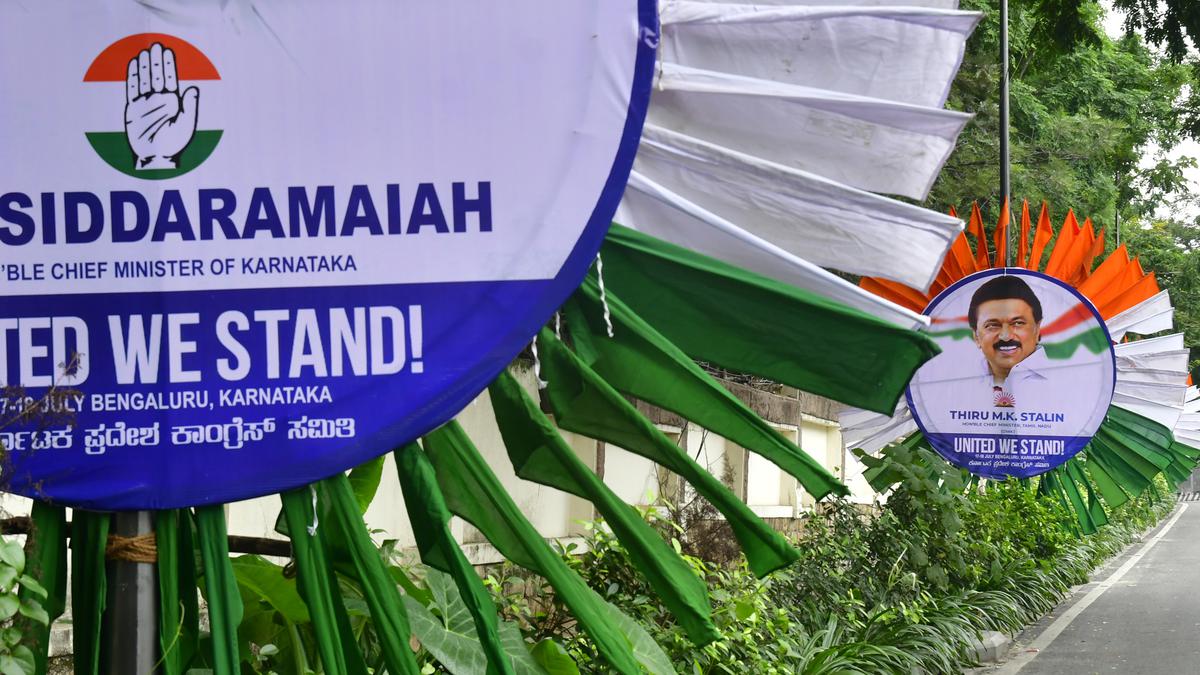
BBMP’s response on action against illegal hoardings leads nowhere: High Court
The Hindu
The High Court of Karnataka on Tuesday expressed dissatisfaction over the response of the Bruhat Bengaluru Mahanagara Palike (BBMP) on the action taken against illegal hoardings, banners, etc. based on the court’s earlier directions.
The High Court of Karnataka on Tuesday expressed dissatisfaction over the response of the Bruhat Bengaluru Mahanagara Palike (BBMP) on the action taken against illegal hoardings, banners, etc. based on the court’s earlier directions.
“The BBMP’s response leads nowhere,” said a Division Bench comprising Chief Justice Prasanna B. Varale and Justice Krishna S. Dixit while hearing PIL petitions on menace of unauthorised advertisement hoardings, banners, buntings, etc.
As an advocate representing the BBMP admitted that the response was filled in a hurry with whatever information available, the Bench granted three weeks for the civic body to file comprehensive response and action taken based on the directions issued by the court.
The Bench specifically asked the BBMP to submit the action taken by the senior officers in case of failure of their sub-ordinate officials in acting against illegal hoardings etc. and explanation in case no such action was initiated against junior officers for dereliction of duty.
When it was complained to the court that the BBMP had failed to submit response to a petition, alleging failure to collect advertisement fee from several hoardings, even after a lapse of 18 months, the Bench said that such a conduct by the BBMP would make public believe that the officials are negligent and there exist unholy nexus between those who commit illegality and the officials.

“Writing, in general, is a very solitary process,” says Yauvanika Chopra, Associate Director at The New India Foundation (NIF), which, earlier this year, announced the 12th edition of its NIF Book Fellowships for research and scholarship about Indian history after Independence. While authors, in general, are built for it, it can still get very lonely, says Chopra, pointing out that the fellowship’s community support is as valuable as the monetary benefits it offers. “There is a solid community of NIF fellows, trustees, language experts, jury members, all of whom are incredibly competent,” she says. “They really help make authors feel supported from manuscript to publication, so you never feel like you’re struggling through isolation.”

Several principals of government and private schools in Delhi on Tuesday said the Directorate of Education (DoE) circular from a day earlier, directing schools to conduct classes in ‘hybrid’ mode, had caused confusion regarding day-to-day operations as they did not know how many students would return to school from Wednesday and how would teachers instruct in two modes — online and in person — at once. The DoE circular on Monday had also stated that the option to “exercise online mode of education, wherever available, shall vest with the students and their guardians”. Several schoolteachers also expressed confusion regarding the DoE order. A government schoolteacher said he was unsure of how to cope with the resumption of physical classes, given that the order directing government offices to ensure that 50% of the employees work from home is still in place. On Monday, the Commission for Air Quality Management in the National Capital Region and Adjoining Areas (CAQM) had, on the orders of the Supreme Court, directed schools in Delhi-NCR to shift classes to the hybrid mode, following which the DoE had issued the circular. The court had urged the Centre’s pollution watchdog to consider restarting physical classes due to many students missing out on the mid-day meals and lacking the necessary means to attend classes online. The CAQM had, on November 20, asked schools in Delhi-NCR to shift to the online mode of teaching.









